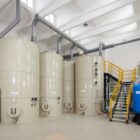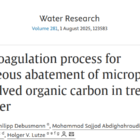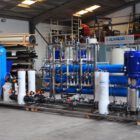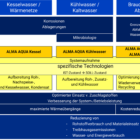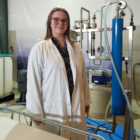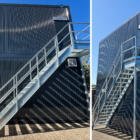Ultrapure water resin refers to specially developed ion exchange resins that are used in water treatment to produce ultra-pure water. This water, also known as ultrapure water, is free of almost all dissolved ions, organic impurities and particles and is used in sensitive industries such as semiconductor production, the pharmaceutical industry or in the production of demineralized water (demineralized water) for steam boilers and laboratories.
Table of contents
Technical principles of ultrapure water resin
Ultrapure water resins are synthetic, polymer-based materials with functional groups that remove ions from the water. They are based on ion exchange technology and are divided into two main types:
Cation exchange resins
These resins contain acidic functional groups, usually sulphonic acid groups (-SO₃H), which remove positively charged ions (cations) such as sodium (Na⁺), calcium (Ca²⁺) or magnesium (Mg²⁺) from the water. The ions are exchanged for hydrogen ions (H⁺).Anion exchange resins
These resins have basic functional groups, usually quaternary ammonium groups (-NR₄⁺), which remove negatively charged ions (anions) such as chloride (Cl-), sulphate (SO₄²-) or nitrate (NO₃-). The anions are exchanged for hydroxide ions (OH-).
By combining cation and anion exchangers, almost all dissolved salts can be removed, as the released H⁺ and OH- ions combine to form water (H₂O).
Properties of ultrapure water resins
1. high exchange capacity
Ultrapure water resins have a high number of active functional groups that enable the efficient removal of ions. The exchange capacity is given in equivalent millimoles per liter (mmol/L) or kilograms per resin volume (eq/L).
2. fine-pored structure
The pore structure of the resins is optimized to effectively absorb both small and large ions. Fine-pored resins offer a larger exchange surface and improve efficiency.
3. chemical stability
Ultrapure water resins are chemically inert to strong acids and alkalis, making them suitable for use even under extreme operating conditions.
4. thermal resistance
The resins can typically withstand temperatures of up to 100 °C, which makes them suitable for use in thermal systems.
5. mixed bed resins
In Reinstwasseranwendungen werden oft Mischbettharze verwendet, die aus einem sorgfältig abgestimmten Verhältnis von Kationen- und Anionenaustauschern bestehen. Diese Harze ermöglichen eine simultane Entfernung aller Ionen und liefern besonders niedrige Leitfähigkeitswerte (< 0,1 µS/cm).
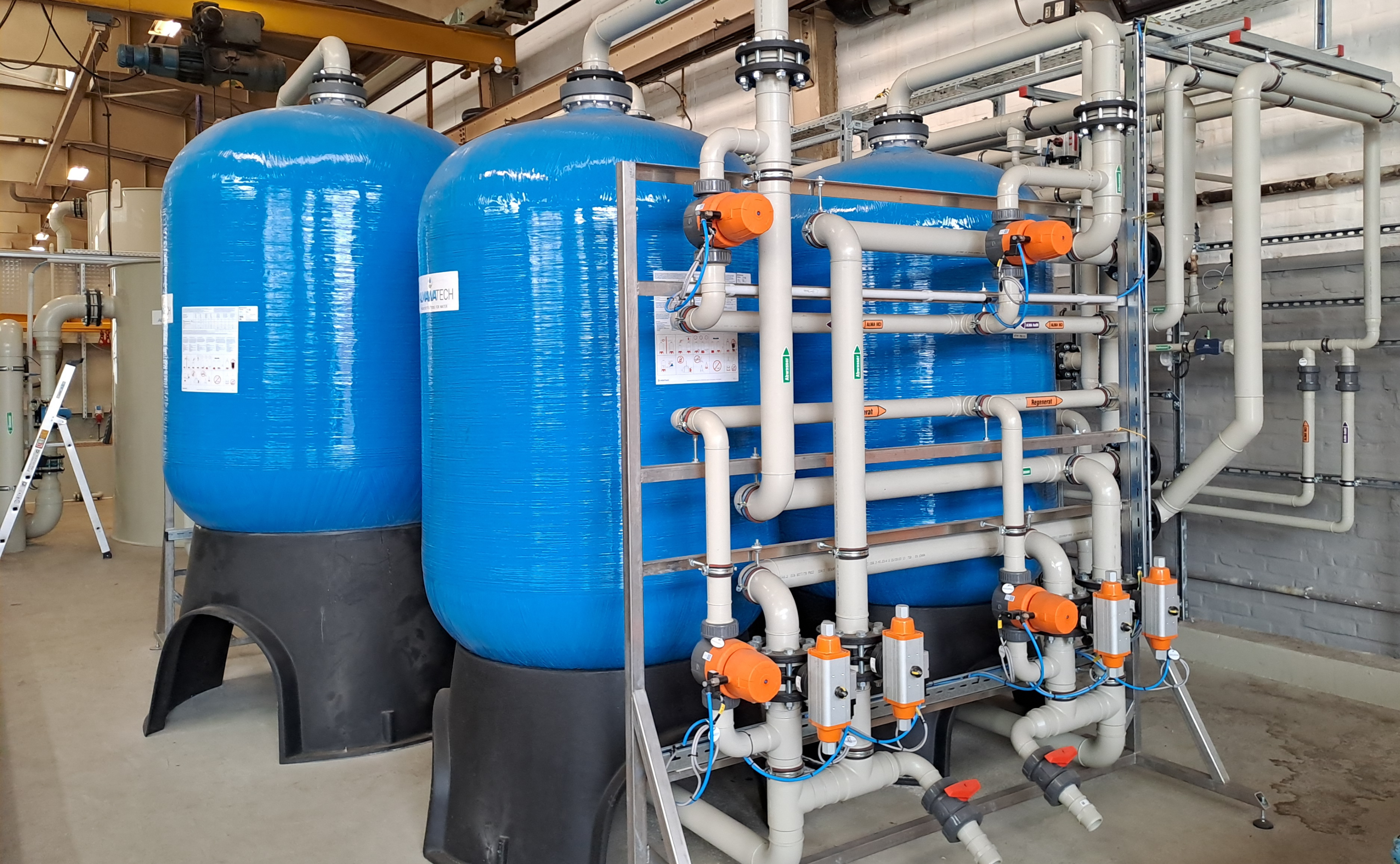
Photo: Our ALMA ION ion exchanger system with upstream ALMA FIL multi-layer filter
Applications of ultrapure water resins
1. production of ultrapure water
In the semiconductor and electronics industry, ultrapure water resins are used to produce water with an extremely low conductivity (up to 0.055 µS/cm). This water is used as process water, e.g. for rinsing wafers, where even the slightest impurities can lead to production errors.
2. demineralized water (fully demineralized water)
Ultrapure water resins are often used to produce demineralized water for use in steam boilers, laboratories and the pharmaceutical industry. Demineralized water is free from dissolved salts and prevents deposits and corrosion.
3. treatment of process water
In the chemical industry, ultrapure water is required to prevent chemical reactions from being influenced by foreign ions. Ultrapure water resins help to achieve the required water quality.
4th polishing stage in reverse osmosis systems
After a reverse osmosis system, ultrapure water resins are used to remove residual ions and further improve the water quality.
Technical implementation and dimensioning
The selection and dimensioning of ion exchanger systems with ultrapure water resins depends on various factors:
Resin type
- Strongly acidic cation exchanger (e.g. H⁺ form): For the removal of cations in saline water.
- Strongly basic anion exchanger (e.g. OH- form): For removing anions, especially heavy metals and nitrates.
- Mixed bed resins: For the production of ultrapure water in a single process stage.
Exchange capacity
The capacity of the resins is dimensioned according to the ion concentration in the raw water. Typical values are between 1.8 and 2.2 eq/L resin volume.
Operating conditions
- pH range: Ultrapure water resins work in a wide pH range from 0-14.
- Temperature: Operating temperatures are typically between 5 and 50 °C.
Operating pressure
The pressure loss through the resin layer should be kept as low as possible, but is usually between 0.1 and 0.3 bar.
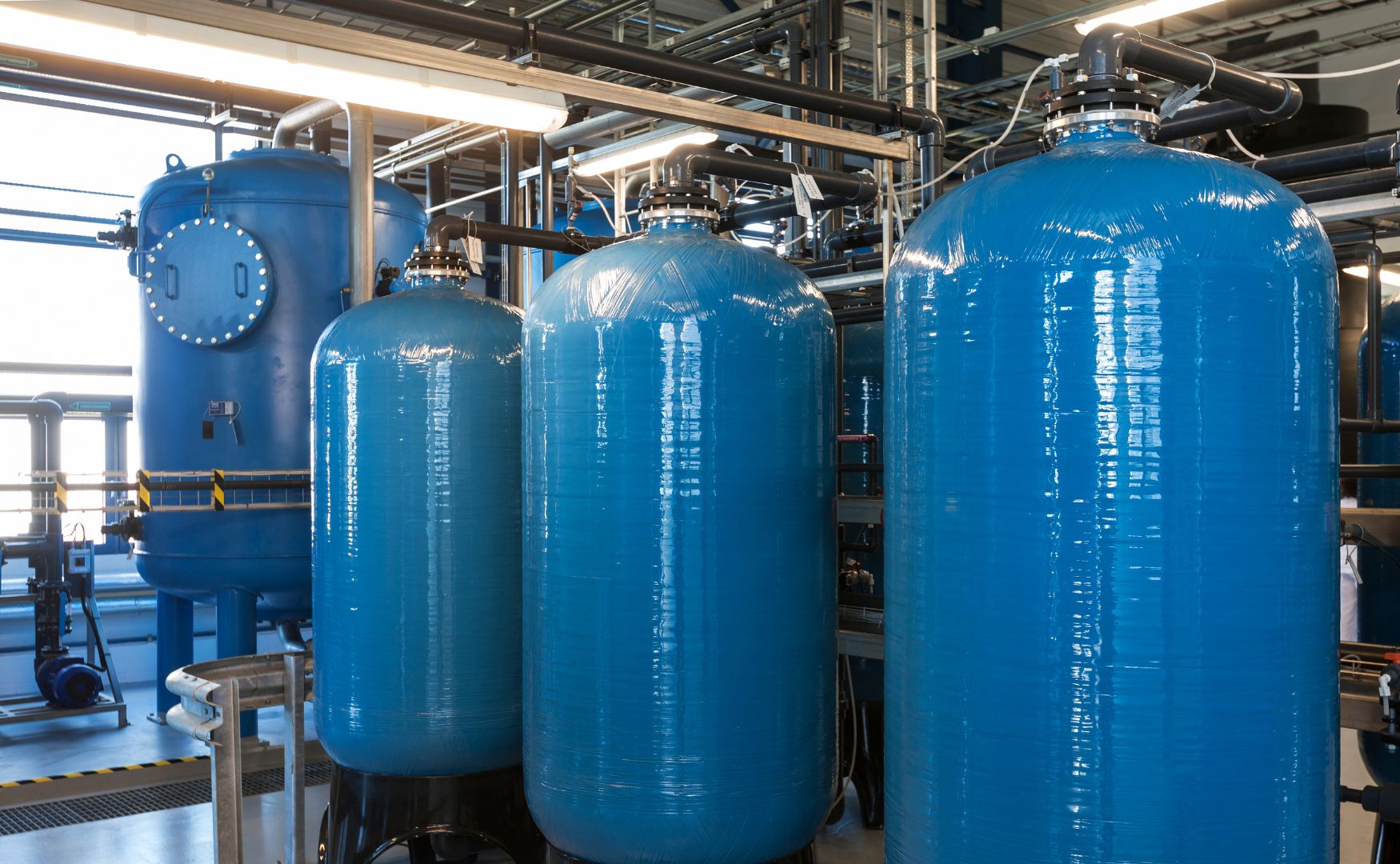
Photo: Ion exchanger in GRP tanks(ALMA ION)
Regeneration of ultrapure water resins
Ultrapure water resins can be reused by chemical regeneration. Regeneration is carried out separately for cation and anion exchangers:
Cation exchanger: With diluted acid (e.g. sulphuric acid or hydrochloric acid) to replace the cations with hydrogen ions.
Anion exchanger: With diluted lye (e.g. caustic soda) to replace the anions with hydroxide ions.
Mixed bed resins
The regeneration of mixed bed resins requires special processes, as the resins have to be regenerated separately by type and then mixed. This process is often carried out externally.
Key performance indicators of ultrapure water resins
The performance of an ultrapure water resin is determined by the following parameters:
- Leitfähigkeit des Reinwassers: Ziel ist eine Leitfähigkeit < 0,1 µS/cm.
- Silicate removal: Efficiency in the removal of silicate (SiO₂), a critical parameter in ultrapure water treatment.
- TOC-Wert: Total Organic Carbon, typischerweise < 5 ppb, um organische Verunreinigungen zu minimieren.
Challenges and optimization
Organic load
Organic impurities can reduce the exchange capacity of the resins. The use of activated carbon filters upstream of the resin systems can minimize this contamination.
Silicate fouling
Silicate (SiO₂) is difficult to remove and can impair the efficiency of the resins. An upstream reverse osmosis system can significantly reduce the silicate load.
Blocking and channeling
Insufficient flow can lead to channeling, which means that the resins are not fully utilized. Regular backwashing of the resin layer can prevent this problem.
Conclusion
Ultrapure water resins are essential components of water treatment and enable the production of high-purity water for demanding industrial applications. Their chemical stability, high exchange capacity and versatility make them indispensable in the production of ultrapure water and demineralized water. Proper dimensioning, the use of high-quality materials and regular regeneration ensure efficient and economical operation. Ultrapure water resins make a significant contribution to meeting the high purity requirements of modern technologies.
For further information on our products, please feel free to contact us at any time!


